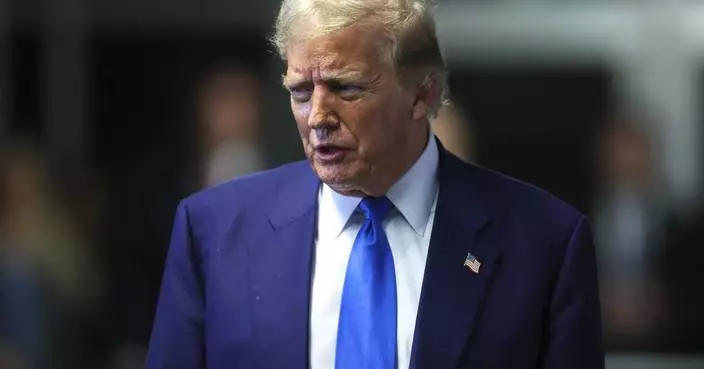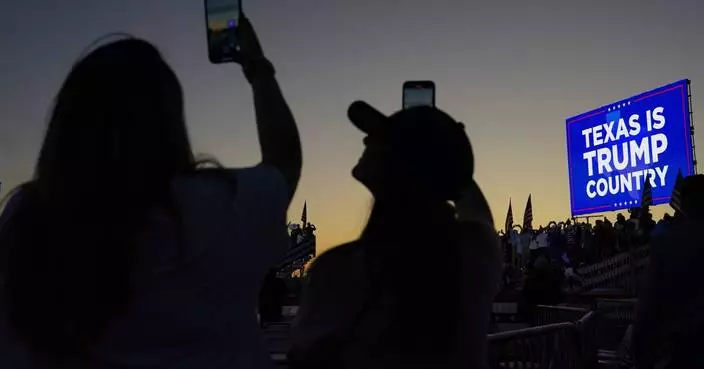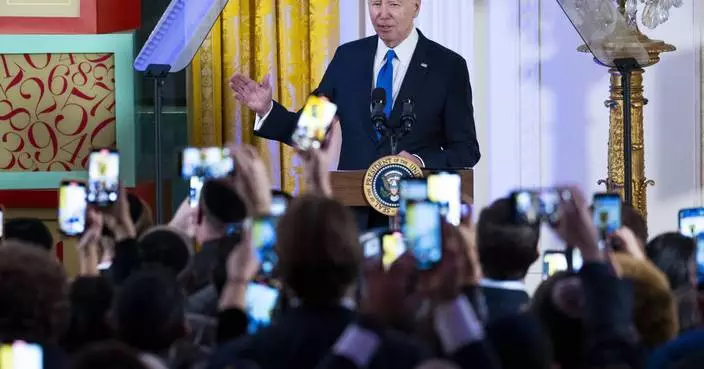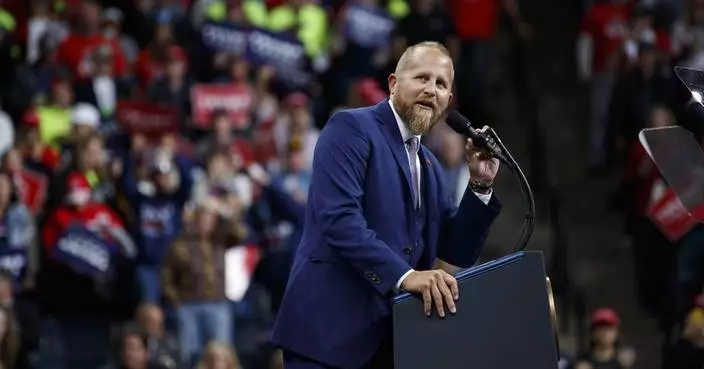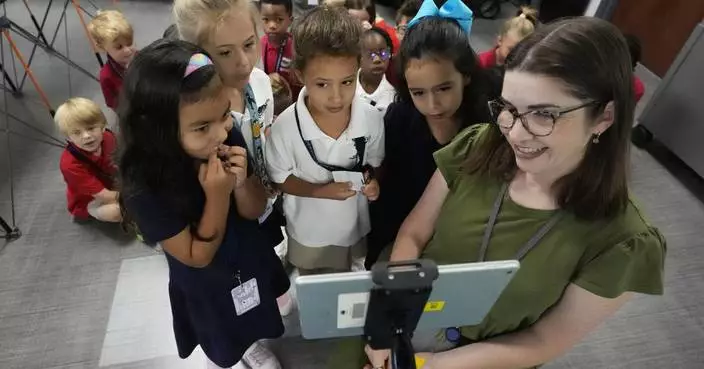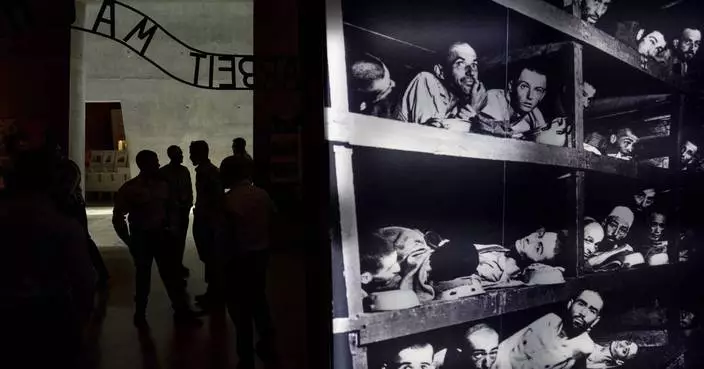President Donald Trump on Thursday abruptly canceled his summit with North Korea's Kim Jong Un, blaming "tremendous anger and open hostility" by Pyongyang — a decision North Korea called "regrettable" while still holding out hope for "peace and stability."
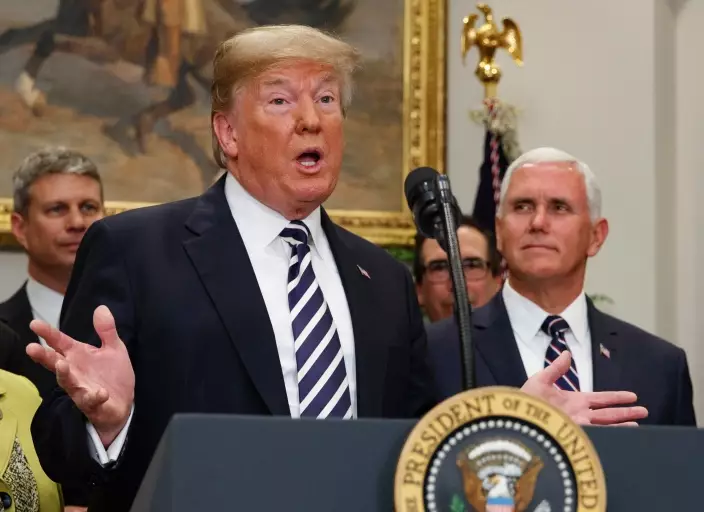
President Donald Trump answers a question about North Korea after signing the "Economic Growth, Regulatory Relief, and Consumer Protection Act," in the Roosevelt Room of the White House, Thursday, May 24, 2018, in Washington (AP Photo/Evan Vucci)
In a letter to Kim announcing his decision to back away from the June 12 summit, Trump pointed to America's vast military might and warned the rising nuclear power against any "foolish or reckless acts."
Click to Gallery
President Donald Trump on Thursday abruptly canceled his summit with North Korea's Kim Jong Un, blaming "tremendous anger and open hostility" by Pyongyang — a decision North Korea called "regrettable" while still holding out hope for "peace and stability."
In a letter to Kim announcing his decision to back away from the June 12 summit, Trump pointed to America's vast military might and warned the rising nuclear power against any "foolish or reckless acts."
Trump's surprise exit capped weeks of high-stakes brinkmanship between the two unpredictable leaders over nuclear negotiating terms for their unprecedented sit-down. The U.S. announcement came not long after Kim appeared to make good on his promise to demolish his country's nuclear test site. But it also followed escalating frustration — and newly antagonistic rhetoric — from North Korea over comments from Trump aides about U.S. expectations for the North's "denuclearization."
Underscoring the high stakes, Trump said he had spoken with military leaders, as well as Japan and South Korea, and stressed that the United States was prepared for any threat.
Trump was briefed Wednesday night and made the decision to exit Thursday morning after consulting with top advisers, including Secretary of State Mike Pompeo and National Security Adviser John Bolton, to whom he dictated the letter, said the senior official.
The letter kicked off a day of mixed messages by the president, who declared hours later, "I really believe Kim Jong Un wants to do what's right." After that, a senior White House official said the North lacked judgment and had reneged on its promises ahead of the summit. Trump said from the White House that a "maximum pressure campaign" of economic sanctions and diplomatic isolation would continue against North Korea — with which the U.S. is technically still at war — but he added that it was possible the summit could still take place at some point.
North Korea issued a statement Friday saying it is still "willing to give the U.S. time and opportunities" to reconsider talks "at any time, at any format."
Vice Foreign Minister Kim Kye Gwan called Trump's decision "unexpected" and "very regrettable," and said the cancellation of the talks shows "how grave the status of historically deep-rooted hostile North Korea-U.S. relations is and how urgently a summit should be realized to improve ties."
Kim insisted North Korea's "objective and resolve to do our best for the sake of peace and stability of the Korean Peninsula and all humankind remain unchanged."
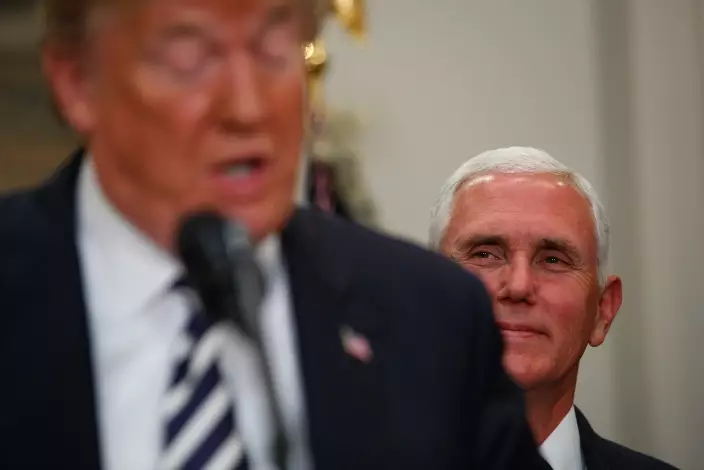
Vice President Mike Pence listens as President Donald Trump delivers a statement on North Korea before signing the "Economic Growth, Regulatory Relief, and Consumer Protection Act," in the Roosevelt Room of the White House, Thursday, May 24, 2018, in Washington. (AP Photo/Evan Vucci)
Trump's surprise exit capped weeks of high-stakes brinkmanship between the two unpredictable leaders over nuclear negotiating terms for their unprecedented sit-down. The U.S. announcement came not long after Kim appeared to make good on his promise to demolish his country's nuclear test site. But it also followed escalating frustration — and newly antagonistic rhetoric — from North Korea over comments from Trump aides about U.S. expectations for the North's "denuclearization."
The senior U.S. official said the North violated a pledge to allow international inspectors to monitor the supposed implosion of the site Thursday. International journalists were present, but the U.S. government can't verify the site's destruction. The official spoke on the condition of anonymity to avoid overshadowing Trump's comments Thursday.
Russian President Vladimir Putin, a staunch Kim ally, said the North Korean leader had in fact done "everything that he had promised in advance, even blowing up the tunnels and shafts" of his country's nuclear testing site. Putin said of Trump's announcement, "In Russia we took this news with regret."
Trump, in his letter to Kim, objected specifically to a statement from a top North Korean Foreign Ministry official. That statement referred to Vice President Mike Pence as a "political dummy" for his comments on the North and said it was up to the Americans whether they would "meet us at a meeting room or encounter us at nuclear-to-nuclear showdown."
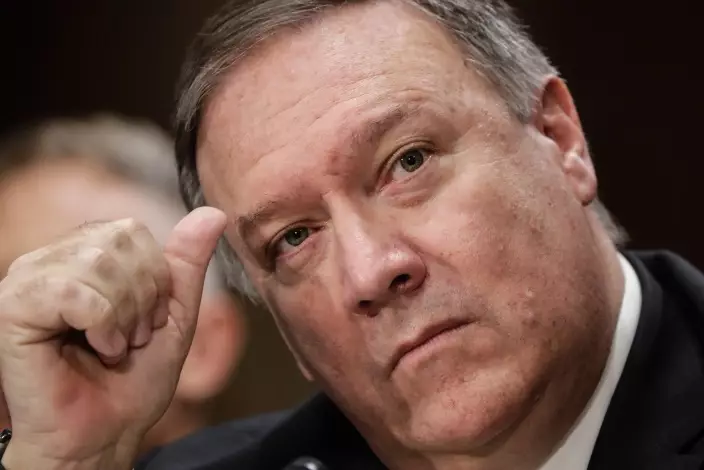
Secretary of State Mike Pompeo answers questions from the Senate Foreign Relations Committee just after President Donald Trump canceled the June 12 summit with North Korea's Kim Jong Un, citing the "tremendous anger and open hostility" in a recent statement from North Korea, on Capitol Hill in Washington, Thursday, May 24, 2018. (AP Photo/J. Scott Applewhite)
Underscoring the high stakes, Trump said he had spoken with military leaders, as well as Japan and South Korea, and stressed that the United States was prepared for any threat.
Still, Trump's announcement appeared to surprise South Korea, which had pushed to keep the summit on track as recently as Tuesday, when President Moon Jae-in met with Trump in the Oval Office and said the "fate and the future" of the Korean Peninsula hinged on the talks. The Blue House said Thursday that it was trying to figure out Trump's intentions in canceling the summit.
Trump, who considers himself a master dealmaker, has confounded aides and allies at every turn of the fateful flirtation with the North. He looked past the warnings of senior aides when he accepted Kim's invitation to meet back in March. He unveiled the date and the time with characteristic showmanship. And after initially projecting calm in the face of North Korea's escalating rhetoric, he made a sudden about face, though his letter also waxed poetic about the "wonderful dialogue" emerging between the two leaders.
Wrote Trump: "If you change your mind having to do with this most important summit, please do not hesitate to call me or write."
It was unclear whether Trump's move marked a negotiating ploy or a manifestation of mounting internal concerns over ensuring a successful outcome for the summit.
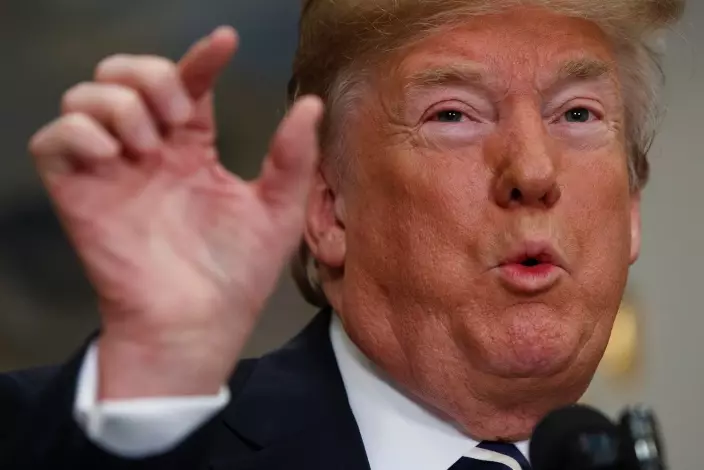
President Donald Trump delivers a statement on North Korea before signing the "Economic Growth, Regulatory Relief, and Consumer Protection Act," in the Roosevelt Room of the White House, Thursday, May 24, 2018, in Washington (AP Photo/Evan Vucci)
Trump was briefed Wednesday night and made the decision to exit Thursday morning after consulting with top advisers, including Secretary of State Mike Pompeo and National Security Adviser John Bolton, to whom he dictated the letter, said the senior official.
The question now is how Trump's maneuvering will be received. His letter could make the situation worse in a society where saving face can be pivotal. Kim might well take offense at the hardnosed U.S. approach after he released American detainees and destroyed a nuclear site.
Trump's aides had warned that merely agreeing to the summit had provided Kim with long-sought international legitimacy and, if Trump ultimately backed out, risked fostering the perception that the president was insufficiently committed to diplomatic solutions to the nuclear question.
U.S. defense and intelligence officials have repeatedly assessed the North to be on the threshold of having the capability to strike anywhere in the continental U.S. with a nuclear-tipped missile — a capacity that Trump and other U.S. officials have said they would not tolerate.
Pompeo, testifying on Capitol Hill, said North Korea had not responded to repeated requests from U.S. officials to discuss logistics for the summit. He told the Senate Foreign Relations Committee the lack of response was an additional reason for Trump's decision.
"We got a lot of dial tones, Senator," he told committee chairman Bob Corker.
A White House team was set to fly to Singapore this weekend to continue logistical planning for the meeting.
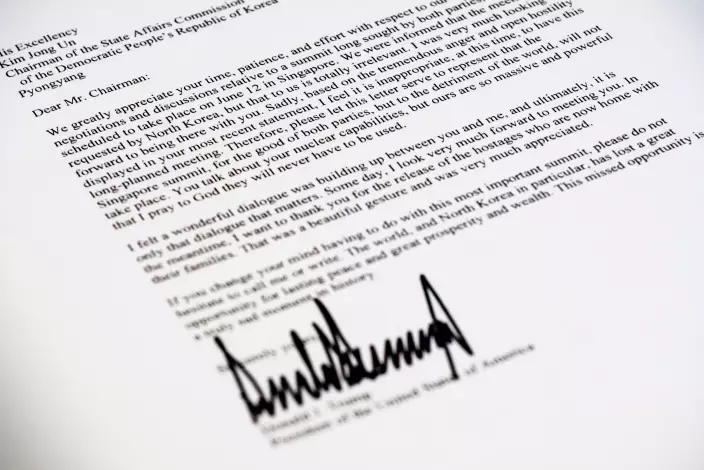
A copy of the letter sent to North Korean leader Kim Jong Un from President Donald Trump canceling their planned summit in Singapore is photographed in Washington, Thursday, May 24, 2018. (AP Photo/J. David Ake
Pompeo said the North's posture had changed markedly since he returned from Pyongyang earlier this month, a trip during which he met with Kim and oversaw the release of three Americans being held. Trump suggested this week that China was to blame for "a little change" in Kim's attitude. Kim paid a secret visit to his primary ally just before Pompeo's visit, and China is wary of any shift in the balance of power on the Korean peninsula.
Trump's allies in Congress applauded the president, saying he was justified in pulling out of the meeting.
"North Korea has a long history of demanding concessions merely to negotiate. While past administrations of both parties have fallen for this ruse, I commend the president for seeing through Kim Jong Un's fraud," said Sen. Tom Cotton, R-Ark.
Critics were less impressed.
House Minority Leader Nancy Pelosi, D-Calif., said it was clear Trump "didn't know what he was getting into and now he's walking away" in a "very chummy, palsy-walsy letter" that's "kind of like a valentine to Kim Jong Un."
White House officials have privately predicted for weeks that the summit could be canceled once or twice before actually taking place. Trump has seemed to welcome chatter of a Nobel Peace Prize, but that has yielded in recent weeks to the sobering prospect of ensuring a successful outcome with the Kim.
NEW YORK (AP) — The judge in Donald Trump’s hush money trial fined him $1,000 on Monday and, in his sternest warning yet, told the former president that future gag order violations could send him to jail. The reprimand opened a revelatory day of testimony, as jurors for the first time heard the details of the financial reimbursements at the center of the case and saw payment checks bearing Trump’s signature.
The testimony from Jeffrey McConney, the former Trump Organization controller, provided a mechanical but vital recitation of how the company reimbursed payments that were allegedly meant to suppress embarrassing stories from surfacing during the 2016 presidential campaign and then logged them as legal expenses in a manner that Manhattan prosecutors say broke the law.
McConney's appearance on the witness stand came as the first criminal trial involving a former American president entered its third week of testimony. His account lacked the human drama offered Friday by longtime Trump aide Hope Hicks, but it nonetheless yielded an important building block for prosecutors trying to pull back the curtain on what they say was a corporate records cover-up of transactions designed to protect Trump's presidential bid during a pivotal stretch of the race.
At the center of the testimony, and the case itself, is a $130,000 payment from Trump attorney and personal fixer Michael Cohen to porn actor Stormy Daniels to stifle her claims of an extramarital sexual encounter with Trump a decade earlier.
The 34 felony counts of falsifying business records accuse Trump of labeling the money paid to Cohen in his company’s records as legal fees. Prosecutors contend that by paying him income and giving him extra to account for taxes, the Trump executives were able to conceal the reimbursement.
McConney and another witness testified that the reimbursement checks were drawn from Trump's personal account. Yet even as jurors witnessed the checks and other documentary evidence, prosecutors did not elicit testimony Monday showing that Trump himself dictated that the payments would be logged as legal expenses, a designation that prosecutors contend was intentionally deceptive.
McConney acknowledged during cross-examination that Trump never asked him to log the reimbursements as legal expenses or discussed the matter with him at all. And another witness, Deborah Tarasoff, a Trump Organization accounts payable supervisor, said under questioning that she did not get permission to cut the checks in question from Trump himself.
“You never had any reason to believe that President Trump was hiding anything or anything like that?” Trump attorney Todd Blanche asked.
”Correct,” Tarasoff replied.
The testimony followed a stern warning from Judge Juan M. Merchan that additional violations of a gag order barring Trump from inflammatory out-of-court comments about witnesses, jurors and others closely connected to the case could result in jail time.
The $1,000 fine imposed Monday marks the second time since the trial began last month that Trump has been sanctioned for violating the gag order. He was fined $9,000 last week, $1,000 for each of nine violations.
“It appears that the $1,000 fines are not serving as a deterrent. Therefore going forward, this court will have to consider a jail sanction,” Merchan said before jurors were brought into the courtroom. Trump’s statements, the judge added, “threaten to interfere with the fair administration of justice and constitute a direct attack on the rule of law. I cannot allow that to continue.”
Trump sat forward in his seat, glowering at the judge as he handed down the ruling. When the judge finished speaking, Trump shook his head twice and crossed his arms.
Yet even as Merchan warned of jail time in his most pointed and direct admonition, he also made clear his reservations about a step that he described as a “last resort.”
“The last thing I want to do is put you in jail,” Merchan said. “You are the former president of the United States and possibly the next president as well. There are many reasons why incarceration is truly a last resort for me. To take that step would be disruptive to these proceedings.”
The latest violation stems from an April 22 interview with television channel Real America’s Voice in which Trump criticized the speed at which the jury was picked and claimed, without evidence, that it was stacked with Democrats.
Once testimony resumed, McConney recounted conversations with longtime Trump Organization finance chief Allen Weisselberg in January 2017 about reimbursing Cohen for a $130,000 payment intended to buy Daniels' silence over her account of a sexual encounter at a 2006 celebrity golf outing in Lake Tahoe, California.
Weisselberg "said we had to get some money to Michael, we had to reimburse Michael. He tossed a pad toward me, and I started taking notes on what he said,” McConney testified. “That’s how I found out about it.”
“He kind of threw the pad at me and said, ‘Take this down,’” said McConney, who worked for Trump’s company for about 36 years, retiring last year after he was granted immunity to testify for the prosecution at the Trump Organization’s New York criminal tax fraud trial.
A bank statement displayed in court showed Cohen paying $130,000 to Keith Davidson, Daniels' lawyer, on Oct. 27, 2016, out of an account for an entity Cohen created for the purpose.
Weisselberg’s handwritten notes spell out a plan to pay Cohen $420,000, which included a base reimbursement that was then doubled to reflect anticipated taxes as well as a $60,000 bonus and an expense that prosecutors have described as a technology contract.
McConney’s own notes, taken on the notepad he said Weisselberg threw at him, were also shown in court. After calculations that laid out that Cohen would get $35,000 a month for 12 months, McConney wrote: “wire monthly from DJT.”
Asked what that meant, McConney said: “That was out of the president’s personal bank account.”
Trump is accused of falsifying business records by labeling the money paid to Cohen in his company’s records as legal fees. Prosecutors contend that by paying him income and giving him extra to account for taxes, the Trump executives were able to conceal the reimbursement.
McConney testified that he had instructed an accounting department employee to record the reimbursements to Cohen as a legal expense.
But McConney acknowledged under cross-examination that Trump never directed him to log Cohen’s payments as legal expenses, nor did Weisselberg relay to him that Trump wanted them logged that way.
“Allen never told me that,” McConney testified. In fact, McConney said he never spoke to Trump about the reimbursement issue at all. Defense lawyer Emil Bove also suggested to McConney that the “legal expenses” label was not duplicitous because Cohen was in fact a lawyer.
“OK,” McConney responded, prompting laughter throughout the courtroom. “Sure. Yes.”
After paying the first two checks to Cohen through a trust, the remainder of the checks, beginning in April 2017, were paid from Trump’s personal account, McConney testified.
With Trump, the only signatory to that account, now in the White House, the change in funding source necessitated “a whole new process for us,” McConney added.
Tarasoff, the other witness who testified Monday, said that once Trump became president, payments from his personal account had to first be delivered, via FedEx, to his new residence in Washington.
“We would send them to the White House for him to sign,” she said.
The checks would then return with Trump’s sharpie signature. “I’d pull them apart, mail out the check and file the backup,” she said, meaning putting the invoice into the Trump Organization’s filing system.
Prosecutors are continuing to build toward their star witness, Cohen, who pleaded guilty to federal charges related to the hush money payments. He is expected to undergo a bruising cross-examination from defense attorneys seeking to undermine his credibility with jurors.
Tucker reported from Washington.
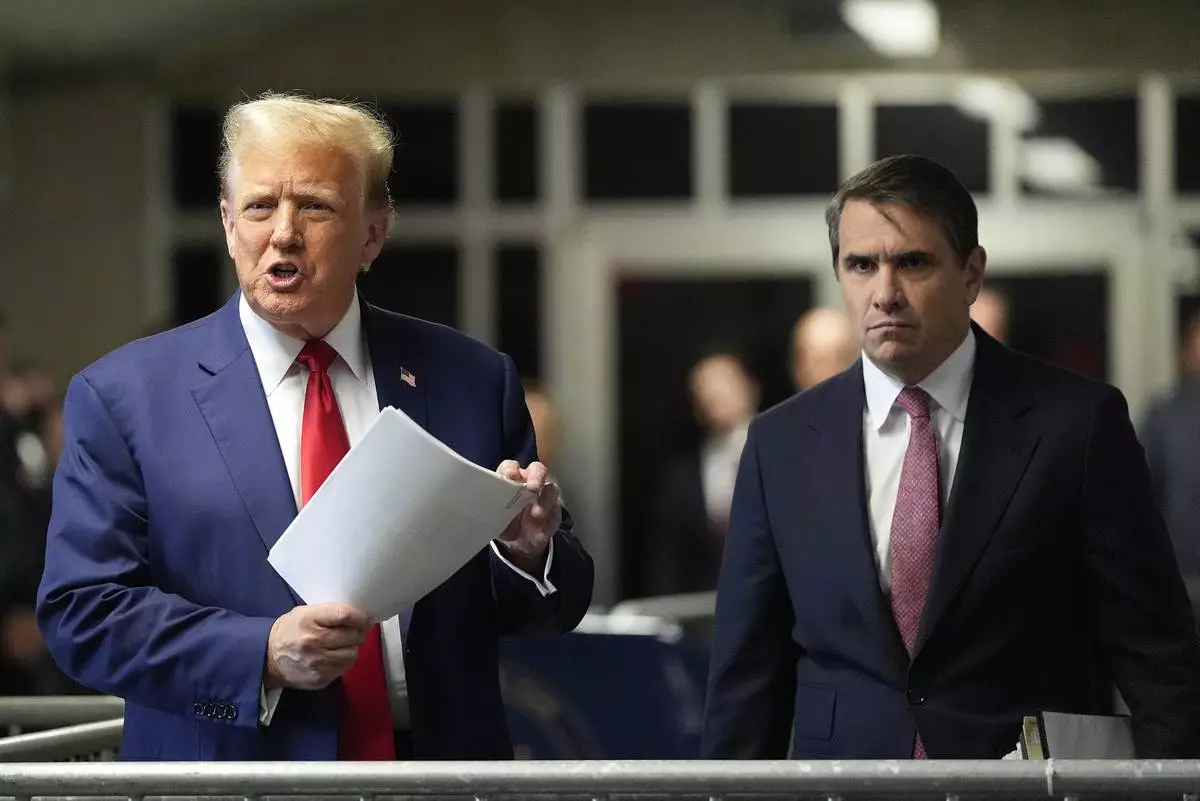
Former President Donald Trump speaks to members of the media before entering the courtroom at Manhattan criminal court, Monday, May 6, 2024, in New York. (AP Photo/Julia Nikhinson, Pool)
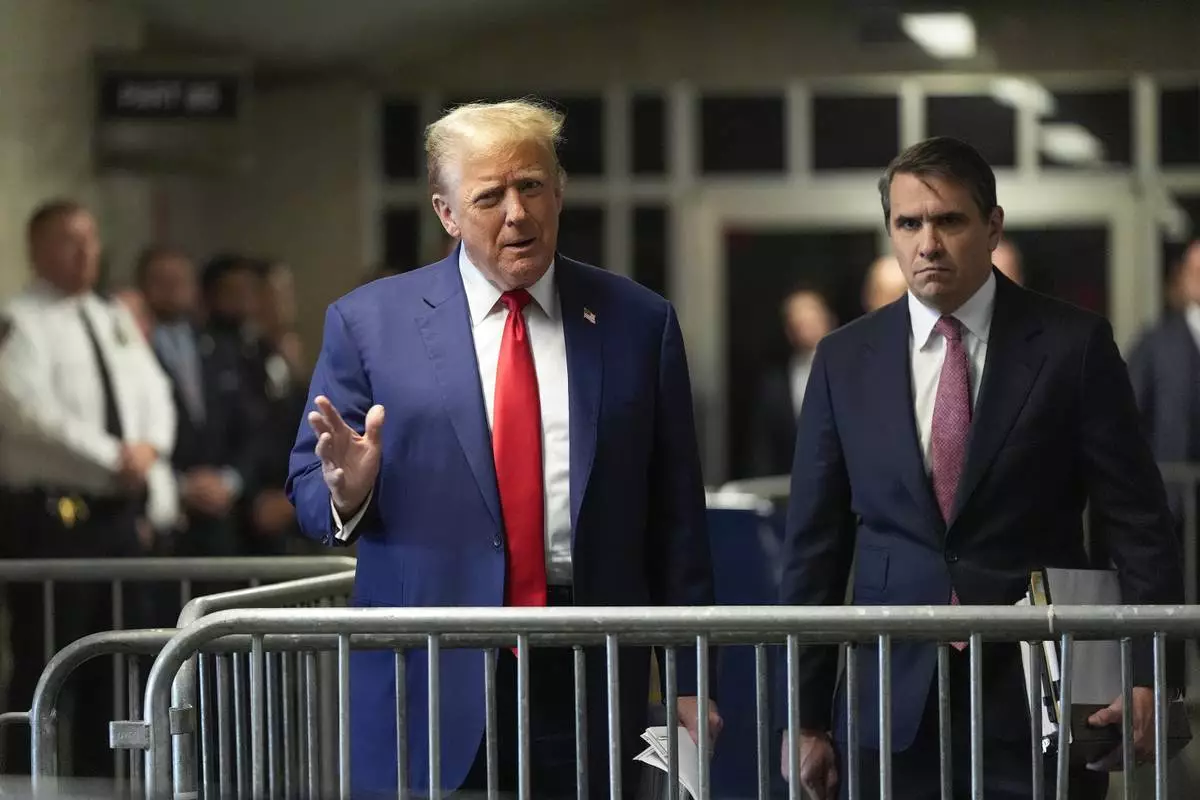
Former President Donald Trump speaks to members of the media before entering the courtroom at Manhattan criminal court, Monday, May 6, 2024, in New York. (AP Photo/Julia Nikhinson, Pool)
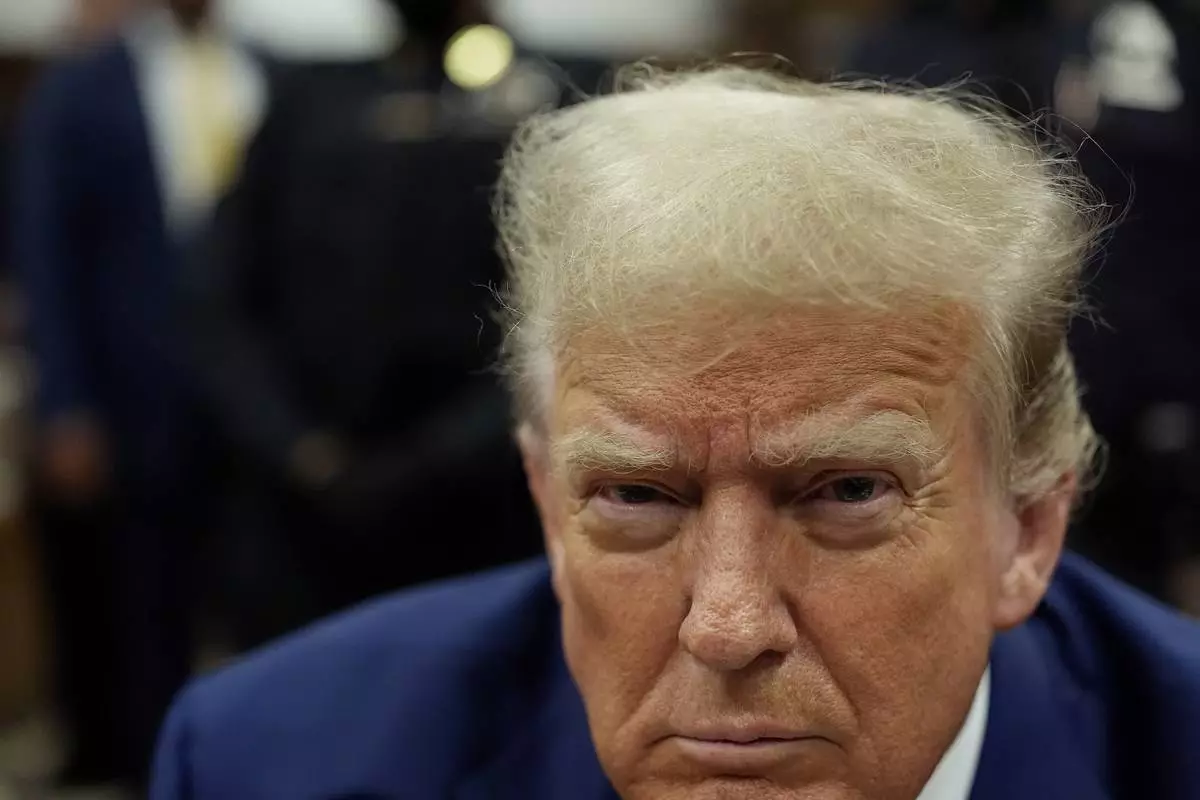
Former President Donald Trump awaits the start of proceedings in his trial at Manhattan criminal court, Monday, May 6, 2024, in New York. (AP Photo/Julia Nikhinson, Pool)
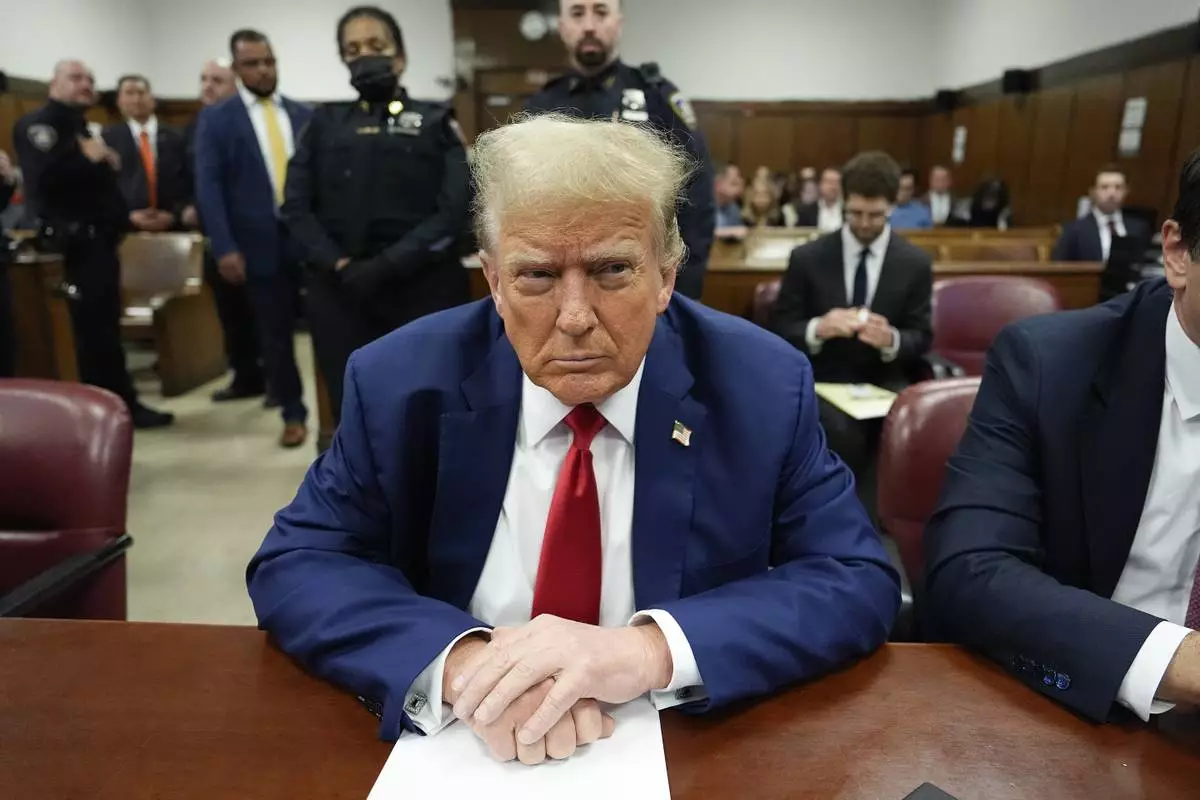
Former President Donald Trump awaits the start of proceedings in his trial at Manhattan criminal court, Monday, May 6, 2024, in New York. (AP Photo/Julia Nikhinson, Pool)
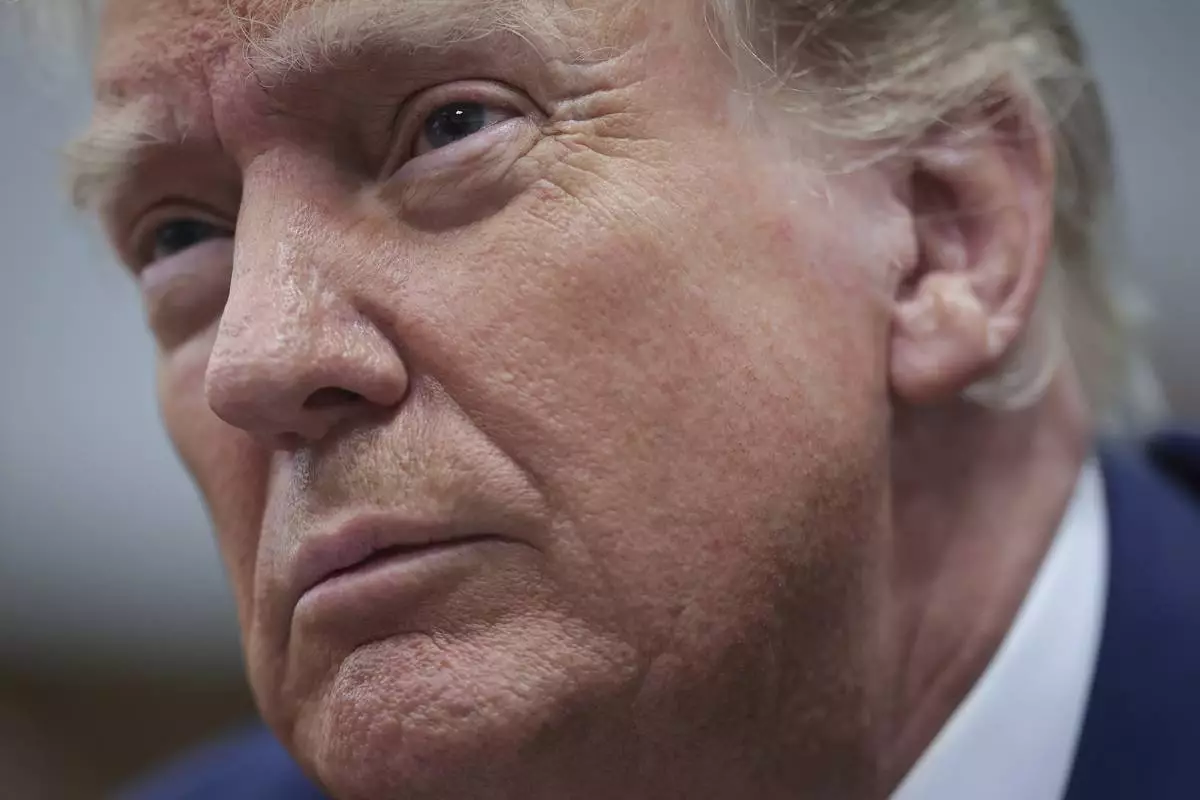
Former President Donald Trump attends his trial at the Manhattan Criminal court, Monday, May 6, 2024, in New York. (Win McNamee/Pool Photo via AP)
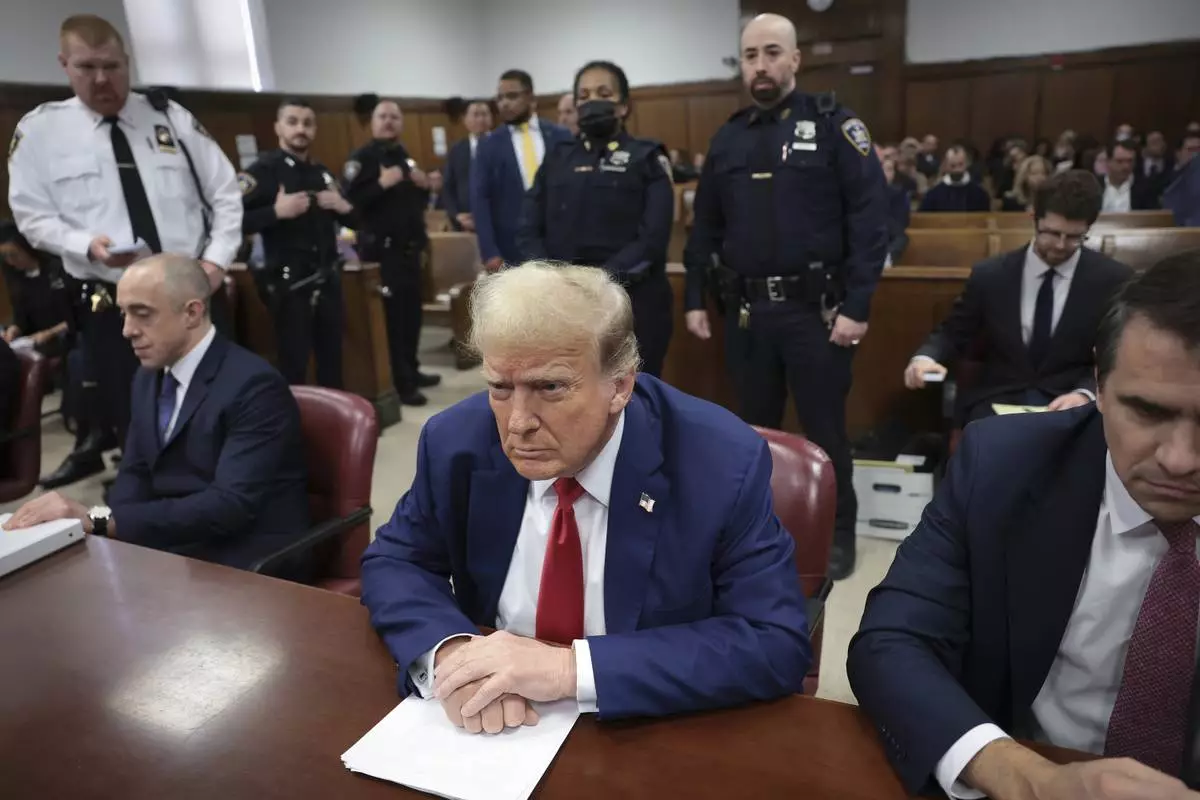
Former President Donald Trump attends his trial at the Manhattan Criminal court, Monday, May 6, 2024, in New York. (Win McNamee/Pool Photo via AP)
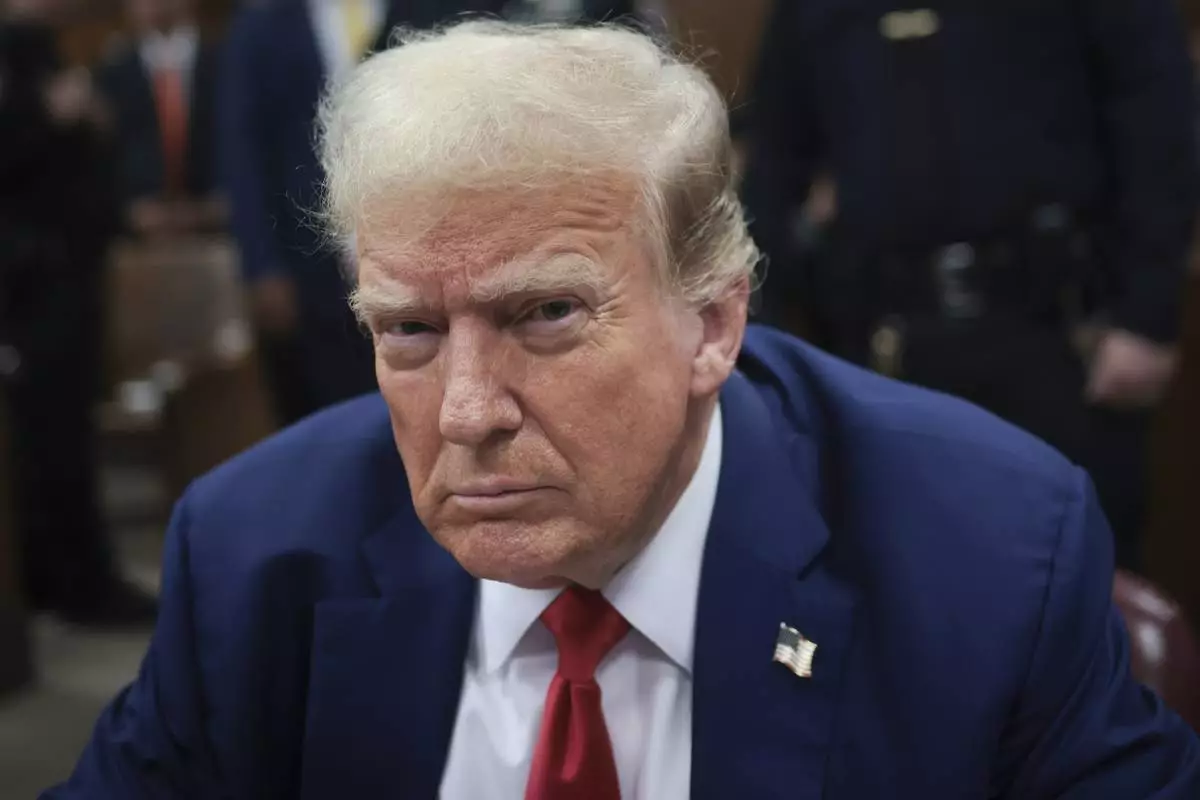
Former President Donald Trump attends his trial at the Manhattan Criminal court, Monday, May 6, 2024, in New York. (Win McNamee/Pool Photo via AP)
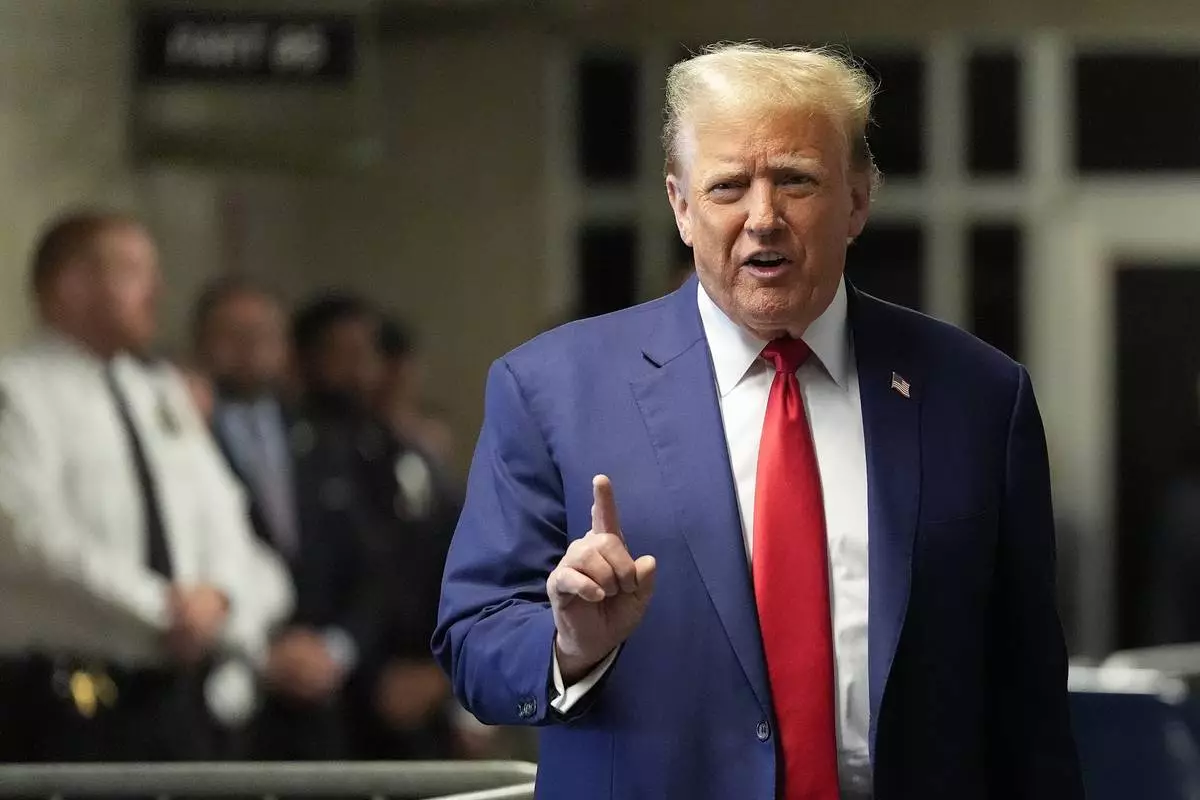
Former President Donald Trump speaks to members of the media before entering the courtroom at Manhattan criminal court, Monday, May 6, 2024, in New York. (AP Photo/Julia Nikhinson, Pool)
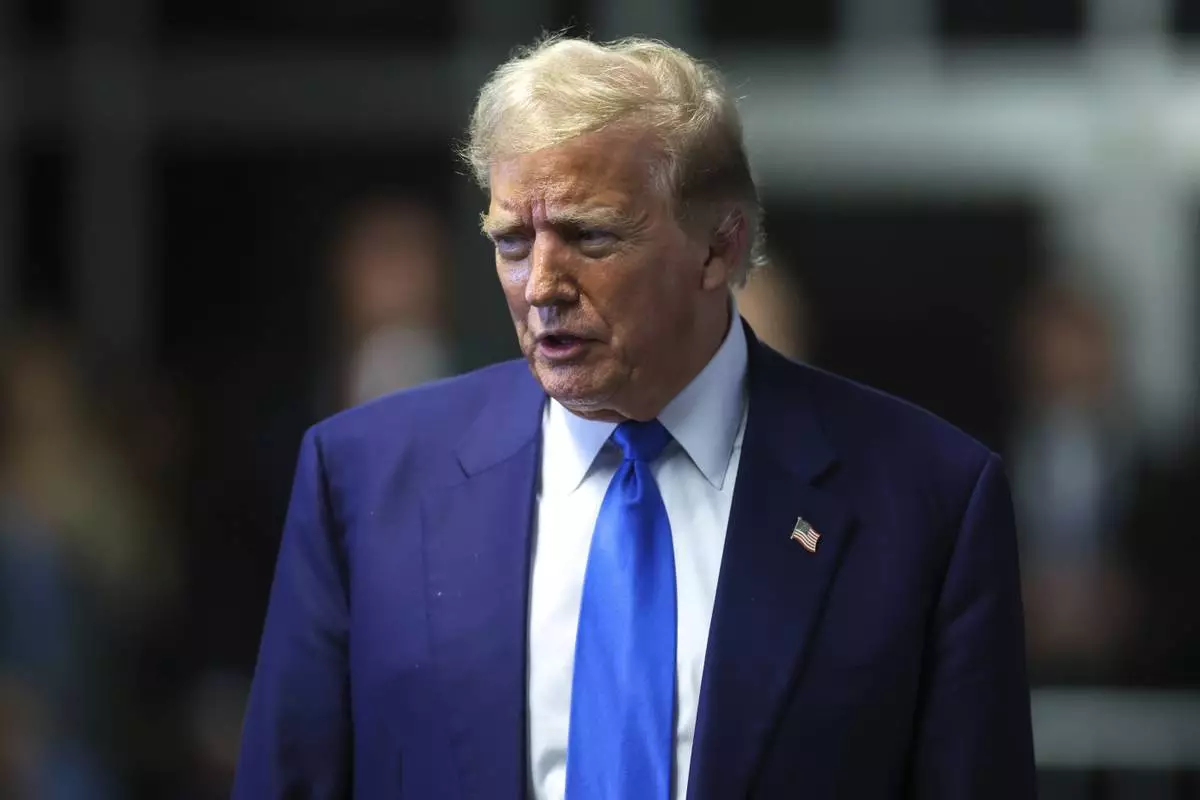
Former President Donald Trump speaks to media as he returns to his trial at the Manhattan Criminal Court, Friday, May 3, 2024, in New York. (Charly Triballeau/Pool Photo via AP)
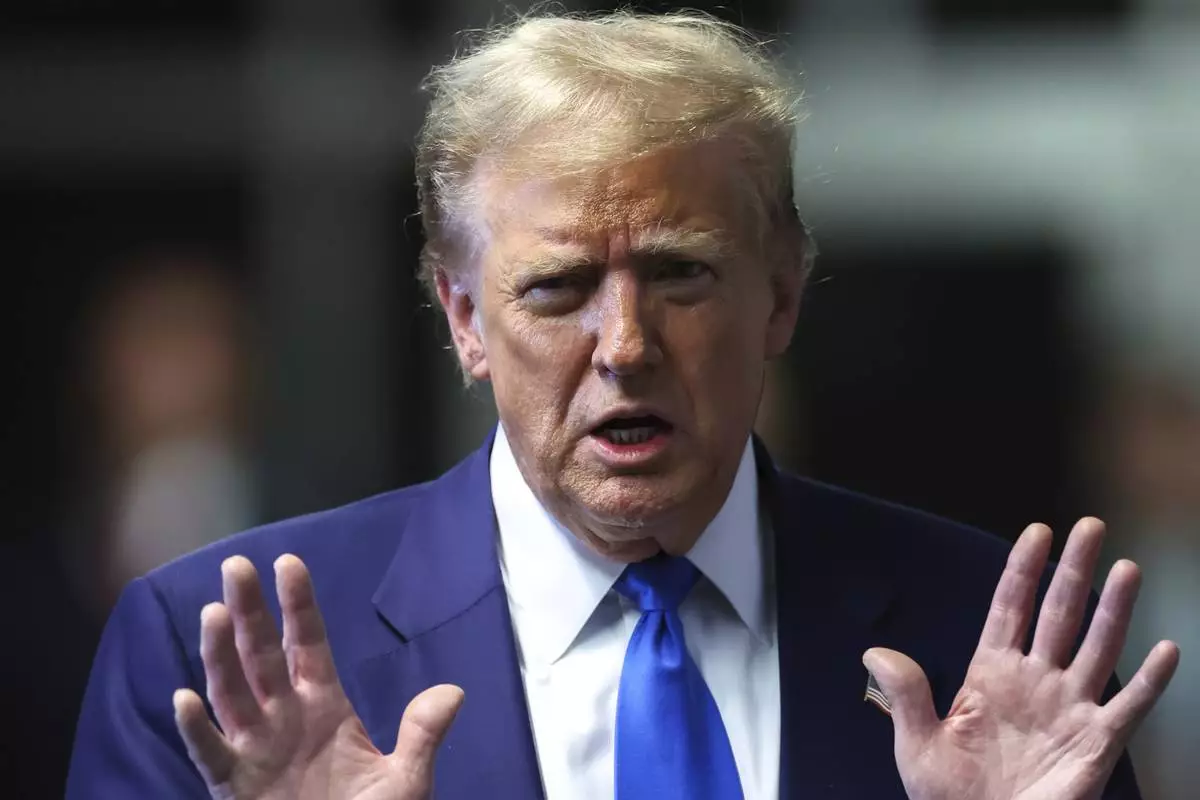
Former President Donald Trump speaks to media as he returns to his trial at the Manhattan Criminal Court, Friday, May 3, 2024, in New York. (Charly Triballeau/Pool Photo via AP)


















